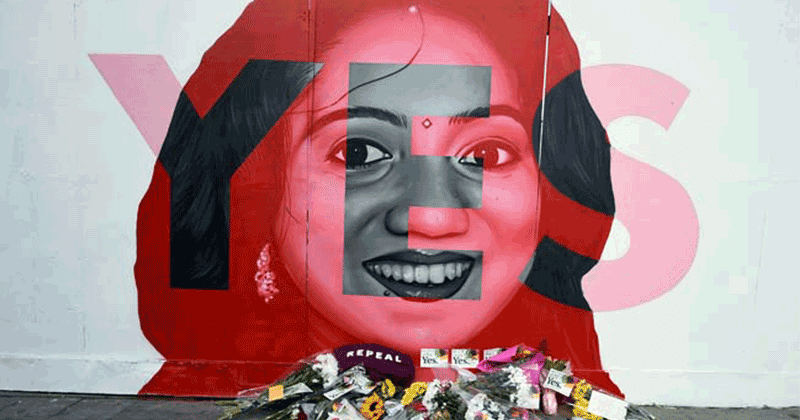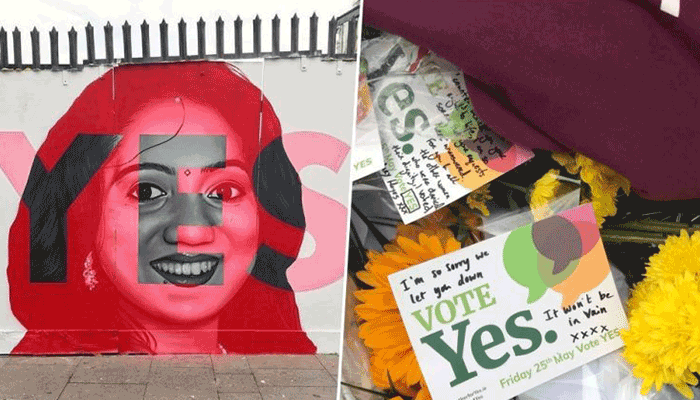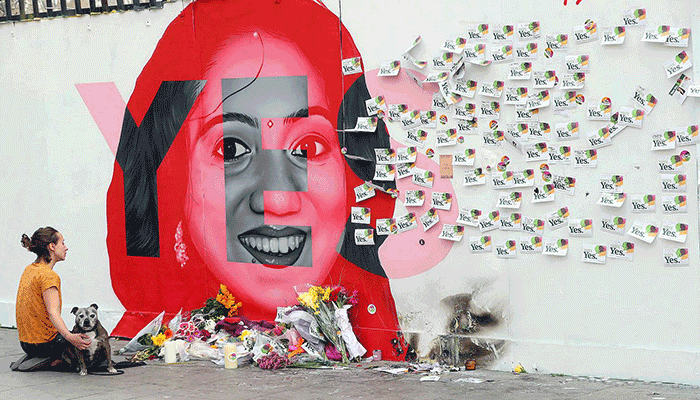
Marking a historic move Ireland has said “Yes” to liberalize its abortion laws.
Although this demand has been going on for years, what was the catalyst that brought this remarkable change?
An Indian woman named Savita Halappanavar.
Savita Halappanavar is a 31-year-old dentist, died at University Hospital Galway in Ireland in 2012 following a septic miscarriage after she was denied an abortion despite asking for one several times.
The first official results of the referendum held on Friday showed that over 66% backed repealing the Eighth Amendment to the Irish Constitution, which outlawed medical termination of pregnancy. Irish PM Leo Varadkar told reporters in Dublin that it was a significant day in the country’s history. “The public has spoken. The results favour of repealing the 8th Amendment. What we see is the culmination of a quiet revolution that has been taking place in Ireland over the last couple of decades,” he said.
As the final tally was announced showing over 66 percent of voters supported lifting the ban, crowds in the ancient courtyard of Dublin Castle began chanting “Savita! Savita!”
With exit polls showing a win for abortion rights campaigners, Prime Minister Leo Varadkar called the apparent victory the “culmination of a quiet revolution.” Later, he hailed the momentous outcome as a victory for Ireland’s future.
“I said in recent days that this was a once in a generation vote. Today I believe we have voted for the next generation,” said Varadkar, who is Ireland’s first openly gay leader as well as its first prime minister from an ethnic minority group.
The next battleground is likely to be Ireland’s parliament, where the government led by Varadkar hopes to capitalize on the fresh momentum and enact legislation spelling out the conditions under which abortions will be legal for the first time by the end of this year.
The plan is to allow abortions during the first 12 weeks of pregnancy and in special cases after the first trimester, likely ending the trail of Irish women who go elsewhere mostly to neighboring Britain — by the thousands each year for abortions they can’t get at home.
“Under the Eighth Amendment, the only thing we could say to women in this country was ‘Take a flight or take a boat,'” Health Minister Simon Harris told Irish broadcaster RTE. “And now the country is saying, ‘No, take our hands, we want to support you.'”
READ ALSO: Catholic country accept abortion; more that 60% voted for ‘Yes’
Some called for the new abortion legislation to be named, “Savita’s law.” Her father, Andanappa Yalagi, said he has “no words” to express his gratitude for Ireland’s “yes” vote.
“We’ve got justice for Savita,” he said from his home in Belagavi in Karnataka on Saturday. “What happened to her will not happen to any other family.”
“I want to say ‘thank you’ to our brothers and sisters in Ireland for voting ‘Yes’. It is very important.
There has been a lot of struggle for Irish women,” he said. Savita’s parents had been advocating a ‘Yes’ vote in the referendum, and released a video last weekend. The video shows Yalagi and his wife Akkamahadevi holding a portrait of their late daughter. In the video, he said no family should endure the pain and suffering they had, and that they continue to feel sorrow six years later. Savita has been the face of the campaign since the date for the referendum was set eight weeks ago. Posters of her smiling face could be seen on hoardings.
“Almost 10% of people who voted to change the abortion laws say her death directly influenced their decision to vote for change. Over the last two days a shrine dedicated to her has emerged in Dublin, where people have been laying flowers and leaving notes of sorrow and gratitude in her memory,” Kitty Holland, the Irish Times reporter who wrote a book on Savita’s ordeal and the subsequent turn of events.

Holland recalled a note that read: “Savita, because you slept many of us woke. Tomorrow we’ll awake to an Ireland less ashamed. Because you came to us our women can now stay with us when they need us. Thank you. Rest in peace.” Hundreds of notes have been fixed to the hoarding beside the mural.
One said: “Sorry we were too late but we’re here now. We didn’t forget about you.” Marcus Bradshaw, 32, who returned home from the Czech Republic to vote ‘yes’, wrote: “We came home in droves for you.” He said being present in Ireland for the referendum was like “watching the Velvet Revolution. The ban on abortion was always about controlling women. This vote is, in some way, about freeing women.”

Liz Fitzpatrick from Dublin said she was struggling with her emotions. “I am so overwhelmed. I was saying to my daughter today, we must never, ever forget her name. I hope her family takes some comfort today when they see how grateful the Irish people are, and how sad,” she told Holland. Despite the relief, Yalagi has regrets. “My daughter was full of life. My agony is that Savita is not with us; she remains only in our memories,” he said.

Post Your Comments